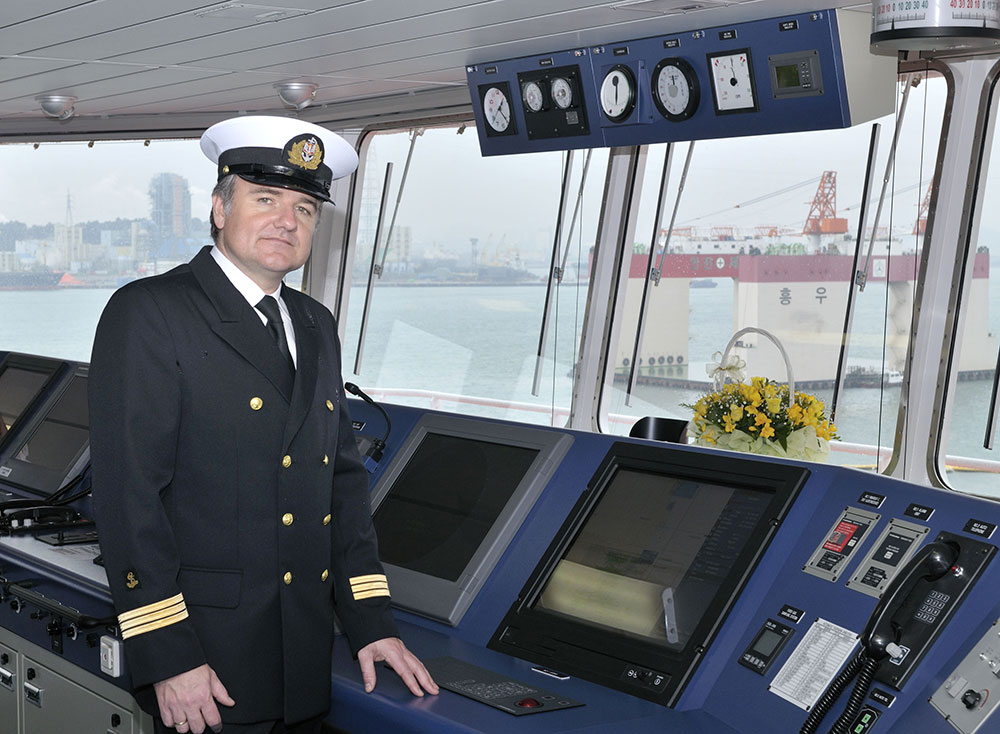Table of Contents
- What Makes a Leader? The Role of Captain Norval Marley
- Who is a Captain, Really?
- How Does a Captain Lead?
- Biography of a Commander - Captain Norval Marley's Path
- Personal Details and Attributes of a Captain
- What Responsibilities Does a Captain Hold?
- Can Anyone Be a Captain Like Norval Marley?
- The Impact of a Captain's Presence
When we consider the idea of a leader, a particular image often comes to mind: someone with clear purpose, a steady hand, and a way of guiding others through challenging moments. This figure, often known by the distinguished term "captain," holds a position of considerable weight and trust. It’s a title that carries with it a sense of profound duty, indicating a person who stands at the forefront, ready to direct and to take full charge of a group or an operation, and this is very much the case with a figure like Captain Norval Marley.
- Ms Seth Only Fans
- Iot Platform Remote Connect
- Paul Michael Einstein
- Best Remote Access For Raspberry Pi And Iot Devices
- Remote Iot Device Platform Free
A captain, you see, is more than just a label; it is a designation given to someone who assumes the highest authority within their specific setting. This person is the one who gives directions, who oversees everything, and who makes sure things run as they should. It’s a role that demands a certain kind of person, someone ready to shoulder the burdens of others, someone who accepts the final word on matters of great importance, so it's a significant role.
Whether it’s guiding a vessel across open water, directing a team in a demanding environment, or even leading a group on the field of play, the core idea remains the same. A captain represents the central point of control, the individual upon whom others rely for direction and for resolution. This concept, quite universally recognized, points to a person who is the very embodiment of control and leadership, much like one would expect from someone holding the name Captain Norval Marley.
What Makes a Leader? The Role of Captain Norval Marley
Thinking about what truly makes a leader, it’s clear that a title like "captain" signifies someone who stands at the top of a group, a person with the highest standing. This person is the one who commands a military unit, or perhaps holds the highest position on a navy ship. They could be the principal officer on a merchant vessel, or the one in control of an aeroplane. In a more futuristic sense, this could even extend to a spacecraft, or any other kind of vehicle that requires a single, guiding hand. The essence of a captain is that they are a leader, someone who directs and steers the course for others, so it's a very broad definition.
- Remoteiot Platform Free
- Xmazanet
- Best Remote Iot Platform Raspberry Pi
- Amanda Morgan Leaving Wmtv
- Remote Iot Raspberry Pi Free
The concept of a captain also reaches into various other parts of life, you know, beyond just ships and military formations. It includes someone who heads up a body of troops, a person whose directions are followed without question. This is a person who is in charge of an aircraft, making sure everyone on board is safe and the journey proceeds as planned. It’s a role that requires a particular kind of temperament, one that can handle the pressures of overseeing complex operations and the well-being of those under their care, and that is certainly true for someone who carries the weight of a name like Captain Norval Marley.
Moreover, the term stretches to include leaders in public service, like an officer within a police or fire department, someone with a fair amount of seniority and the authority to make critical choices. It also applies to the person who guides a sports team, the one who rallies the players and sets the example on the field. This person is someone who stands at the head of others, holding authority over them, and providing a clear path forward. This broad sense of leadership is something we can associate with the idea of Captain Norval Marley, as it speaks to a person who is consistently in a position of command.
Who is a Captain, Really?
So, when we ask who a captain truly is, the answer points to an individual designated to take charge and to lead a collection of people. This is a role that frequently shows up in settings such as military operations, naval expeditions, or aviation activities. They carry the burden of overseeing and giving commands, making sure that every part of an operation runs smoothly and that the group works together effectively. It’s about being the central point of decision-making, the one who holds the ultimate responsibility for the group's actions and outcomes, a very significant role indeed.
Consider, for a moment, the picture of a captain smiling, perhaps touching their hat, a gesture that conveys both confidence and approachability. This person is the one who holds responsibility for the goods being transported, or for the very vessel itself. They are the ones who must account for any loss, ensuring that everything is in order. It's a role that requires a deep commitment to the task at hand, and a willingness to stand accountable for all that happens under their watch. This sense of personal responsibility is a core characteristic of anyone holding such a position, including, we can assume, Captain Norval Marley.
The idea of a captain also suggests a journey, a path where one might, with time and dedication, rise through the ranks to assume such a significant post. It’s about the person who is in control of a ship or an aircraft, guiding it through all conditions. Or it could be an officer of a middle rank within the army or the navy, someone who has proven their capability and leadership. They are the ones with the job of overseeing and commanding, ensuring that all tasks are completed and that the group remains unified in its efforts. This consistent presence of command defines the very nature of a captain.
How Does a Captain Lead?
A captain leads, you know, by being the central point of direction, the one who sets the course for everyone else. They provide the guidance needed to move forward, making sure that each person understands their part in the larger effort. This means giving clear instructions, making sound choices, and always keeping the overall objective in sight. It's about being the person who can look at a situation, assess what needs to be done, and then effectively communicate that to the team. This kind of direction is what allows groups to function as a cohesive whole, something a person like Captain Norval Marley would undoubtedly do.
Leadership from a captain also involves a great deal of responsibility for the welfare of those under their command. They are the ones who must look out for their team, ensuring their safety and providing the necessary support for them to carry out their duties. This goes beyond just giving orders; it involves creating an environment where people can perform their best, knowing they have a dependable leader at the helm. It’s a very human aspect of command, where empathy and strength walk hand in hand, and it's a quality that would certainly be present in a true leader.
Ultimately, the way a captain leads is through a blend of authority and example. They don't just tell people what to do; they often show them how it's done, or at least demonstrate the standards expected. This creates a sense of trust and respect among the group, making them more willing to follow the captain's lead, even when conditions are difficult. This kind of leadership, built on a foundation of clear direction and personal responsibility, is what defines the role, and it's something we can certainly attribute to the concept of Captain Norval Marley.
Biography of a Commander - Captain Norval Marley's Path
While specific life details about Captain Norval Marley are not provided here, we can certainly sketch out the kind of journey a person with such a significant title would typically undertake. The path to becoming a captain, whether in a military unit, aboard a ship, or leading a team, is generally marked by a progression of increasing responsibility and a constant demonstration of competence. It’s a route that demands dedication, a willingness to learn, and an ability to make sound choices under pressure. This progression, you see, builds the kind of character required for such a role.
A captain's background, then, would involve a series of experiences that hone their leadership capabilities. They would have spent time in various positions, gaining a deep practical grasp of the operations they would eventually oversee. This might include periods of intense training, where they developed the skills needed to direct complex systems, or perhaps time spent working closely with others, learning the nuances of team dynamics. The journey itself is a testament to their commitment to service and their continuous effort to better themselves for the sake of their duties, and this is quite typical for someone who attains the rank of captain.
The narrative of a captain is often one of quiet determination, of facing challenges head-on and finding solutions when others might falter. It is about a person who consistently steps forward, ready to accept the highest level of accountability for their actions and for the actions of those they guide. This personal history, though not detailed in specific events for Captain Norval Marley, is implied by the very nature of the title itself. It speaks to a life lived in the pursuit of effective leadership and unwavering responsibility, which is a powerful thing to consider.
Personal Details and Attributes of a Captain
Given the general idea of a captain, we can outline the typical attributes and roles that someone like Captain Norval Marley would embody. These aren't personal facts about an individual, but rather the characteristics and duties inherent in the position of a captain, drawn from the widely accepted meanings of the term.
| Primary Role | The commanding officer; the supreme leader; the person in charge. |
| Areas of Authority | Military units, naval vessels, merchant ships, aircraft, spacecraft, police departments, fire departments, sports teams. |
| Core Responsibilities | Overseeing, commanding, guiding, taking charge of groups or operations; ensuring safety and successful completion of tasks. |
| Key Qualities | Holds authority over others; makes critical choices; accountable for outcomes; provides clear direction; leads by example. |
| General Disposition | Composed, responsible, decisive, capable of inspiring trust and cooperation. |
These details, you know, paint a picture of a person who is consistently at the forefront, someone whose presence brings order and direction to any situation. They are the ones who bear the weight of decision-making, understanding that their choices have a direct impact on the well-being and success of their entire group. It's a role that demands a certain kind of fortitude and a deep understanding of human dynamics, allowing them to effectively manage and motivate those around them.
The attributes listed here are not merely titles; they represent a set of skills and a mindset that a captain cultivates over time. They reflect a person who is not only capable of directing operations but also of fostering an environment where others can thrive under their guidance. This combination of practical ability and interpersonal skill is what truly sets a captain apart, making them a pillar of strength and reliability for their team. It's a comprehensive set of expectations, really.
What Responsibilities Does a Captain Hold?
A captain, such as Captain Norval Marley, holds a vast array of responsibilities, which are quite central to their role. The fundamental duty is to oversee and command. This means they are the ultimate authority, the one who makes the final choices and ensures that those choices are carried out effectively. Whether it’s a military unit preparing for an operation or a ship heading into rough seas, the captain is the one who bears the ultimate burden for the outcome. This level of accountability is, in some respects, immense.
Beyond simply giving orders, a captain is also responsible for the well-being and performance of their entire group. This includes ensuring the safety of everyone under their charge, from crew members on a ship to officers in a police department. They must also make sure that the objectives are met, whether it’s delivering cargo safely, winning a game, or completing a critical mission. This requires a sharp mind, an ability to think quickly, and a deep understanding of the situation at hand, something a true leader would possess.
Furthermore, the captain is the one who must deal with any unexpected issues that arise. If there's a problem with the freight on a ship, or if a situation changes suddenly in a military context, it falls to the captain to find a solution and to manage the consequences. They are expected to replace any loss, to account for any misstep, and to guide their team through difficulties. This ongoing need for problem-solving and adaptability is a constant part of their daily duties, and it is a very demanding aspect of the role.
Can Anyone Be a Captain Like Norval Marley?
When we consider if just anyone can become a captain, like the idea of Captain Norval Marley, the answer leans towards the notion that while the title is open to many, the qualities required are quite specific. It takes more than just a desire to lead; it requires a certain set of personal attributes and a willingness to accept significant burdens. One must possess the ability to guide others, to stand at the head of a group, and to take charge when it truly matters. This kind of role isn't for the faint of heart, you know.
The path to becoming a captain often involves proving oneself over time, demonstrating competence and reliability in various situations. It’s about showing that you can make sound choices, even when conditions are difficult, and that you can inspire confidence in those around you. This progression through different ranks and experiences helps to build the necessary skills and temperament. So, while the opportunity might be there, the dedication and inherent qualities needed are quite particular, as a matter of fact.
So, while the title of captain is a designation for someone who leads and takes charge, the true essence of being a captain, much like one would imagine for Captain Norval Marley, lies in the consistent demonstration of command, responsibility, and the capacity to guide others through any challenge. It’s a role earned through effort and a deep commitment to the welfare and success of the group.
The Impact of a Captain's Presence
The presence of a captain, such as Captain Norval Marley, creates a profound impact on any group they oversee. Their very existence at the helm provides a focal point, a person to whom others can look for direction and stability. This sense of having a reliable leader in charge helps to calm anxieties and to instill confidence, particularly when situations are uncertain or challenging. It’s a bit like having a steady hand on the wheel, even when the waters get rough.
This impact extends to the overall efficiency and morale of the team. When a captain is clear in their instructions and firm in their resolve, it allows everyone else to perform their duties with greater certainty. This reduces confusion and fosters a sense of shared purpose, which is quite important for any group aiming to achieve a common goal. A good captain, you see, helps to create an environment where people feel supported and understood.
Ultimately, the captain's presence shapes the entire culture of the unit or organization. Their approach to challenges, their way of communicating, and their personal example set the tone for everyone else. This influence can lead to a group that is resilient, adaptable, and highly capable, reflecting the strength and character of its leader. It is a powerful form of influence, really, that radiates from the person at the very top.
- Remote Iot Vpc Ssh Raspberry Pi
- Cenk Torun Latest News
- Ralph Moore Jr
- Remoteiot Vpc Price
- Sal Melons


